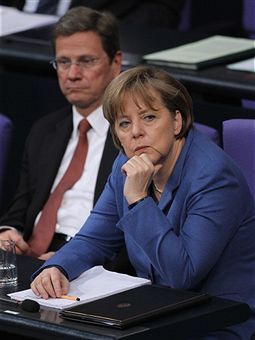 Like an unseasonal Atlantic gale, the Portuguese sovereign debt crisis has blown in to
ruin the latest EU summit. This meeting was intended to mark the beginning of the end of the eurozone crisis. Instead, the ponderous European Union has been overtaken by events, with grave
consequences.
Like an unseasonal Atlantic gale, the Portuguese sovereign debt crisis has blown in to
ruin the latest EU summit. This meeting was intended to mark the beginning of the end of the eurozone crisis. Instead, the ponderous European Union has been overtaken by events, with grave
consequences.
Already speculation about contagion is rife: Spain, Malta* and Italy are now being spoken of in hushed and exasperated tones. The Economist’s Charlemagne correspondent reports that several countries are now wary of the monetary pact that Germany is demanding for delving deeper into its pockets, because they do not want to be accused of surrendering sovereignty. Likewise, the injection into the European Financial Stability Facility has been postponed until June because Finland does not want to commit before its imminent general election.
Most of all, Portugal’s crisis intensifies Ireland’s desperation. It was thought that Ireland’s Enda Kenny would emerge from this summit with the promise of a restructured bank capitalisation programme and an improved rate of interest; in return for “engagement” (not action) on the corporation tax rate. That now looks extremely unlikely. Nicolas Sarkozy has told the Irish Times that he expects no such discussion at today’s summit.
It appears that Ireland has been asked for more concessions in light of Portugal’s collapse. Apparently, Kenny’s officials have ceased to negotiate with Merkel and Sarkozy, saying there can be no deal on corporation tax. An impasse seems to have been reached and Kenny’s hopes now rest on the bank stress tests.
There is a growing sense that the EU (and Germany in particular) has been juggling too many balls for too long. The Irish Times also reports that Germany’s patience is near exhausted, and not just with Ireland:
‘In Berlin yesterday before she travelled to Brussels German chancellor Angela Merkel made it clear that she continues to expect a substantial quid pro quo from Mr Kenny in return for any interest rate cut. “No – one in Europe will be left alone. No – one will be allowed fall , because Europe can only succeed together. But this requires, of course , . . . a sensible mix of self-exertion and solidarity ,” she told the Bundestag. “I can tell you, we’re not that far in the talks with Ireland. “I’ll be perfectly honest with you. I’d rather take care of Europe’s growing competitiveness than continually spend my time taking care of rescue programmes for other countries.”
Merkel is in serious difficulty at home and facing an election dominated by Germany’s growing euro-anger (if not euroscepticism). But her irate retorts have bald implications for Ireland, Portugal and the euro in general.
* Malta’s economic performace is strong and inflation is slowing there. But I’m told there are concerns about its rising public debt. Whether those are justified is another matter; it’s the speculation that it is issue.
UPDATE: The Maltese High Commission has been in touch to contest speculation that its economy is under strain. It takes issue with the CIA’s national debt estimates, saying that debt stands at 68 percent of GDP. It adds that ‘the Maltese government does not have to borrow on the international market as 98 percent of the debt is serviced locally and owned mainly by Maltese individuals by way of Government bonds issue, which are normally oversubscribed.’ Further, it says that the budget deficit for 2010 was 3.6 percent, an improvement on projections of 3.9 percent. Finally, it says that the banks in Malta are sound and that there has been no residential property crisis.






Comments